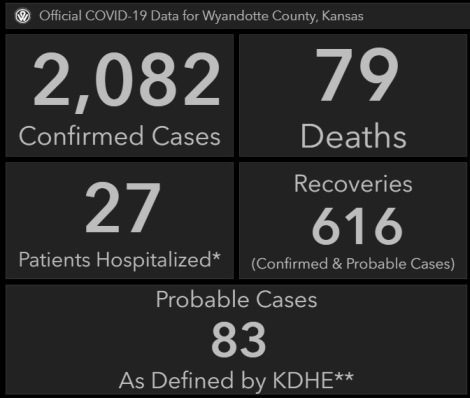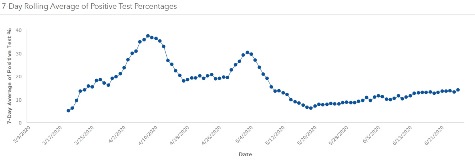


Positive COVID-19 cases have gone over the 2,000 total mark in Wyandotte County, Health Department officials reported at Thursday night’s Unified Government Commission meeting.
At 4 p.m. Friday, June 26, the total cumulative cases were 2,082, with 79 deaths. It was an increase of 66 cases since 4 p.m. Thursday, and an increase of one death, according to the UG’s COVID-19 website.
Juliann van Lieu, director of the UG Health Department, said Wyandotte County currently has the most COVID-19 cases of counties in the state.
She said, on Thursday evening, that a 7-day rolling average showed a steady incline of cases in Wyandotte County. They are typically seeing about 25 to 30 new cases a day, averaged among seven days.
“It’s very concerning to us,” she said at the UG Commission meeting. As they consider next steps they will need to think about what is the threshold for them to consider drastic measures as they see the numbers climb, she added.
In general, the number of deaths from COVID-19 has declined in the past two weeks in Wyandotte County.
Earlier, large case numbers in Wyandotte County had a lot to do with the long-term care facilities, and they are keeping an eye on that, she said.
Dr. Erin Corriveau, deputy medical officer for Wyandotte County, said the percent positivity rate is increasing a bit. Around mid-May, the numbers started to come down. At that time, the University of Kansas Hospital started testing all the patients coming in, including those with symptoms and those without, which pulled the positivity rate down.
They had a concerning positivity rate of 30 percent at the Health Department testing on Monday. Overall, the community is just under 20 percent, she added.
On race and ethnicity case rates, there have been increases in Asian cases, and Hispanic cases have increased greatly recently, she said.
The Health Department’s epidemiologist, Elizabeth Groenweghe, said there are quite a few outbreaks that the Health Department is working on, and many are at workplaces. These are generally where employees are working close together in enclosed places.
New cases were reported on June 24 at Liberty Fruit Company, which has 14 total cases; and Kellogg’s Bakery, which has 23 total cases, according to UG Health Department information.
Nordic Foods, 4747 Speaker Road, had five COVID-19 cases, with the last one reported June 17, according to the UG’s COVID-19 website.
SunOpta, 1103 Blake St., Edwardsville, reported eight COVID-19 cases on June 25, according to the UG’s COVID-19 website. Additional outbreaks are listed on the UG’s COVID-19 webpage.
Also, they are following an outbreak now at Bonner Springs Nurse and Rehab, she said. They have a strategy in place now to test residents and staff every week, if an outbreak is reported there.
One person came to a church service at La Fe En Jesu Cristo with COVID-19, she said, and later other cases were identified. There were six cases reported there, she said.
Dr. Allen Greiner, chief medical officer for Wyandotte County, said they have published some guidance this week on reopening for long-term care facilities. All are concerned about reopening, he said. They worked with the homes and with the long-term care task force group, to set reopening measures.
It is a stepped approach, to reopen when they are able to test, screen and take other health precautions. If facilities want to reopen, they will be asked to test all employees every 14 day to see if they may be asymptomatic but might be infected, he said.
For educational institutions, the Health Department has worked with educators from all sectors to put plans together. The plans have been distributed, he added. There are also statewide groups working on guidelines, also. He said they will try to align with all the plans. The guidelines are at https://alpha.wycokck.org/Coronavirus-COVID-19-Information.
Churches are allowed to be open in the current phase, he said. They are strongly recommending the use of face masks and encouraging people not to sing. There are also guidelines about social distancing, with a 45-person limit, he added.
The new Wyandotte County guideline on churches is online at https://www.wycokck.org/WycoKCK/media/Health-Department/Documents/Communicable%20Disease/COVID19/COVID-19GuidelinesForChurches.pdf.
A Business Toolkit was developed by the Health Department staff to provide guidance on businesses reopening and is on the UG Health Department’s COVID-19 website, he said.
“We’ve extended this Phase 3 we’re in, and we’ll be in this phase, watching the data, until at least July 6,” Dr. Greiner said. “The reason we extended is related to this uptick in cases we are seeing. Since we made that decision last week, we are continuing to see this uptick.”
Both regionally and nationally, there are a lot of concerns right now with increased cases, and they will be closely watching the numbers. They’re hearing certain places in Texas may be starting to restrict elective surgeries.
Although Wyandotte County is now leading in case numbers in the state, it is not leading in hospitalization rates, and the death rates have been down, Dr. Greiner said. They want to work hard to maintain that, he added.
Wyandotte County has more restrictions than other counties because it is more concerned about the vulnerable population, he said. This county historically had worse health rankings than other nearby counties, and having more in place to protect the vulnerable gives them the best chance to weather the pandemic, he said.
“We feel that the science is on our side,” Dr. Greiner said. They are following the science and expert opinions, he added.
Dr. Greiner said they have not made any final decisions about mandatory mask-wearing in public. They are encouraging people to wear masks, wash their hands and socially distance.
Kansas City, Missouri, announced mandatory mask-wearing on Friday.
At a Friday news conference in Kansas City, Missouri, Dr. Greiner said Wyandotte County is currently working on its own mask ordinance and may have more information later.
“We are seeing increased data, just published in the last 10 days, that suggests this may make a big difference. We are not seeing the best compliance with mask-wearing as a recommendation,” Dr. Greiner said.
More and more places are implementing mask-wearing requirements, he said. There would questions about how to enforce it and how to educate people about it, he added. They will probably discuss it in the future.
Dr. Greiner said over time, they’ve seen more data come in that there is significant aerosolization of the virus when people are speaking loudly, singing and talking. That is where the 6-foot distance comes in. Currently, they don’t think it spreads as much on surfaces as they originally thought, or on food, he added.
When looking back to the first clusters at churches here, he said they wish they would have known as much about the aerosolization that was happening. Also at meat processing plants, aerosolization might have happened with the sawing equipment, meat and humid air, he thinks.
Any mask creates a barrier for the virus and small particles to be jettisoned out, he said. If two people have a mask, it’s creating a significant lessening of risk in that environment.
That is why bars and restaurants are risky, because people have to have masks off to eat and drink, he added. He would encourage at least intermittent mask use there, he added. Barriers are the key to the use of the mask.
Dr. Greiner said it’s possible for people without symptoms to spread the virus, which is why everyone should wear masks. Those who have symptoms probably have a higher viral load in their bloodstream and saliva. If it gets to someone else, their chances of getting sick are higher, he said.
“If you’re sick, stay home,” Dr. Greiner said.
Van Liew said Wyandotte County is eligible for $37 million in CARES Act funding. Those who are eligible to apply for the funding would include UG departments, city governments, nonprofits, health care, social services, education and businesses in Wyandotte County.
The funds may be used for testing, tracing, personal protective equipment, modifying workspace, providing social needs such as food and housing.
Applications will be available on June 29 on the UG’s website, she said. Applications will close July 13. An internal review team will review applications, then submit the proposal to the state by Aug. 1. They are hoping to disburse funds by Sept. 1, depending on the state’s timeline, and the funds would have to be used by the end of this year.
On Friday at the University of Kansas Health System news conference, Dr. Steve Stites, chief medical officer at KU Health System, answered questions about masks.
He said wearing a mask is not dangerous and it does not cause poisoning. There are a few people with severe conditions such as emphysema who may not be able to wear them, however. He said surgeons sometimes wear masks for four to six hours at a time and they do fine.
To those who say wearing a cloth mask doesn’t protect them, Dr. Stites said it protects others. People should want to see others wearing masks, and if they do, it means they’re protected, he said.
Dr. Dana Hawkinson, medical director of infection prevention and control at the University of Kansas Health System, said the main reason for surgeons to wear surgical masks is to protect others if a person has the virus. A cloth mask can offer 40 to 80 percent of the protection of a surgical mask, he said. The main reason to wear a mask is to avoid spreading the virus to others, and there will be some protection to the person wearing it, he added.
To people who say if they’re not sick they don’t need to wear a mask, Dr. Hawkinson said people don’t always know when they’re sick, especially with COVID-19.
Dr. Stites said wearing a mask is protecting everyone around you.
“We have politicized the mask issue, and that’s wrong,” Dr. Stites said.
“Don’t make it a political issue, make it a health issue, because that’s really what it is, and it keeps you safe when you do it,” he said.
KU Health System also reported they had collected 163 units of blood, exceeding the blood drive’s goal of 130 units. The Community Blood Center still is under their goal of a seven-day supply and they encouraged people to visit savealifenow.org to find information about how to give blood. Their donor sites are open on the weekends.
Dr. Hawkinson reported 19 patients in KU Health System on Friday morning, down from 22 on Thursday. They also reported nine patients in the intensive are unit, the same as Thursday, and six on ventilators.
There were four patients discharged and three admitted.
There has been an increase in patients who are 20 to 40 years old, possibly the result of people going to restaurants, bars and gatherings.
Some of the the people in that age group also have returned to work.
Doctors at the KU Health System on Thursday said they did not think they would need to restrict surgeries. They said they currently had ample personal protective equipment and space for patients.
On Friday morning, the Kansas Department of Health and Environment reported 13,538 cases and 264 deaths from 95 counties.
It was an increase of 568 cases since Wednesday. There were three more deaths since Wednesday statewide.
Long-term care deaths went up statewide from 149 to 153, according to KDHE statistics.
To see the KU doctors’ news conference, visit https://www.facebook.com/kuhospital/videos/265594608052332/.
To see the UG Commission meeting update on COVID-19, visit https://www.youtube.com/watch?v=LUbg2AZhdtA
COVID-19 test sites in Wyandotte County are listed at https://wyandotte-county-covid-19-hub-unifiedgov.hub.arcgis.com/pages/what-to-do-if-you-think-you-have-covid-19
The state’s COVID-19 test page is at https://www.coronavirus.kdheks.gov/280/COVID-19-Testing
Residents may visit the UG COVID-19 website at https://alpha.wycokck.org/Coronavirus-COVID-19-Information or call 311 for more information.
The UG’s COVID-19 information page is at https://alpha.wycokck.org/Coronavirus-COVID-19-Information.
Wyandotte County is currently under Phase 3. See covid.ks.gov.
The state plan’s frequently asked questions page is at https://covid.ks.gov/wp-content/uploads/2020/05/Reopening-FAQ_5.19.2020_Final.pdf.
The CDC’s COVID-19 web page is at https://www.cdc.gov/coronavirus/2019-nCoV/index.html.
